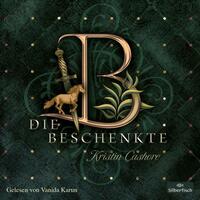Take a photo of a barcode or cover
Loved the whole book - the demise of Leck seemed a bit rushed though compared to the pacing of the entire book. It was a nice twist but still quite rushed. It could have been drawn out a bit.
Look forward to reading the other companion books! I hope they're just as great as Graceling, and I love the fact that this is a standalone books - I am so sick and tired of series.
Look forward to reading the other companion books! I hope they're just as great as Graceling, and I love the fact that this is a standalone books - I am so sick and tired of series.
adventurous
challenging
emotional
funny
hopeful
inspiring
mysterious
tense
medium-paced
Plot or Character Driven:
A mix
Strong character development:
Yes
Loveable characters:
Yes
Diverse cast of characters:
Yes
Flaws of characters a main focus:
Complicated
adventurous
hopeful
lighthearted
medium-paced
Plot or Character Driven:
A mix
Strong character development:
Yes
Loveable characters:
Yes
Diverse cast of characters:
Complicated
Flaws of characters a main focus:
No
Graphic: Domestic abuse, Murder, Gaslighting, Injury/Injury detail
adventurous
fast-paced
Plot or Character Driven:
A mix
Strong character development:
Yes
Loveable characters:
Yes
<>
Overall, I found this to be a really enjoyable read. At first, the book seemed to delve too far into the depths of fantasy for me to enjoy it. After some reading, though, the settings and situations seemed familiar enough with just some fantasy mixed in. Told from a third person limited point of view, we learn the story through the strong female main character, Katsa's, experiences. I found the point of view a refreshing change from many first person narratives I've been reading lately, and I imagine it would have been challenging to write. Cashore pulled it off beautifully, staying consistent throughout the novel. The characters and story were interesting and kept me turning pages easily. That and the adventure of facing off with an oh-so-bad villain made it difficult for me to put the book down.
I liked watching the love interest unfold. While Katsa's adamant feelings against marriage differ from my own views and values, I found it appropriate that her character would have those feelings, given her upbringing. MOST of the time, her feelings on the issue made sense as something relevant to the character rather than the author trying to attack the institution of marriage.
The book has a brief love scene that doesn’t get too graphic. While I enjoyed this book, I would not want my children to read it as teenagers. I am disappointed that this book is directed at our youth. I think it takes a higher reading level to understand that Katsa’s experiences have caused her to misinterpret marriage, and young, impressionable minds do not need any extra misguidance toward worldly standards of virtue, whatever the circumstances.
<<>>
And now I’ll speak freely without worrying about giving anything away.
While I did see Katsa’s aversion to marriage as being relevant to her character and her experiences, I thought the quote at the end of the book where Katsa says, “I told him I’m not going to marry you and hang on to you like a barnacle, just to keep you to myself and stop you loving anyone else,” seemed really incongruent with what makes sense as her reasoning for being against marriage. She has very little experience with friendship or even kindness, much less love, and she sees marriage as just another way she would be succumbing to Randa’s wishes, just another way of letting someone own her. That makes sense. But to have her make that comment about keeping Po to herself just seemed random, and it felt like the author was pushing her own views into the story where they didn’t seem to fit.
Also, in spite of the relevance of Kat’s feelings, I was troubled by the absolute lack of thought toward maintaining one’s virtue in spite of an aversion to marriage. Virtue never seemed to be any type of consideration to the characters, as long as things were consensual, which could be due to the culture of the setting. But since so many characters seemed to have traditional views of marriage (although quite archaic in comparison to our current views), I have to assume that their concepts of fornication would be the same. In that case, I find it irresponsible to be targeting our youth with the unaccountable idea of taking a lover in lieu of marriage.
I enjoyed the relationship developing between Katsa and Po, but the end fell flat for me. I thought if she was in a relationship (whether she chose it or not) that made her wake up worried that he would be gone because she was unhappy to be out of his company, then why did they go their separate ways at the end of the book? It just felt too casual to be the strong love that they professed.
Also, I really didn’t like Po going blind. I know he has his grace to help him out with that, but it still really bugs me. I guess I’m just a blue skies/happy ending type of gal because I don’t like the main characters to get hurt in such a way that they can’t heal unless I know the book is meant to be a tragedy. Or maybe I’m shallow, and I just think that lovers should be able to see each other. Either way, I kept hoping Raffin would whip out some remedy at the last minute and give him back his sight.
Overall, I found this to be a really enjoyable read. At first, the book seemed to delve too far into the depths of fantasy for me to enjoy it. After some reading, though, the settings and situations seemed familiar enough with just some fantasy mixed in. Told from a third person limited point of view, we learn the story through the strong female main character, Katsa's, experiences. I found the point of view a refreshing change from many first person narratives I've been reading lately, and I imagine it would have been challenging to write. Cashore pulled it off beautifully, staying consistent throughout the novel. The characters and story were interesting and kept me turning pages easily. That and the adventure of facing off with an oh-so-bad villain made it difficult for me to put the book down.
I liked watching the love interest unfold. While Katsa's adamant feelings against marriage differ from my own views and values, I found it appropriate that her character would have those feelings, given her upbringing. MOST of the time, her feelings on the issue made sense as something relevant to the character rather than the author trying to attack the institution of marriage.
The book has a brief love scene that doesn’t get too graphic. While I enjoyed this book, I would not want my children to read it as teenagers. I am disappointed that this book is directed at our youth. I think it takes a higher reading level to understand that Katsa’s experiences have caused her to misinterpret marriage, and young, impressionable minds do not need any extra misguidance toward worldly standards of virtue, whatever the circumstances.
<<
And now I’ll speak freely without worrying about giving anything away.
While I did see Katsa’s aversion to marriage as being relevant to her character and her experiences, I thought the quote at the end of the book where Katsa says, “I told him I’m not going to marry you and hang on to you like a barnacle, just to keep you to myself and stop you loving anyone else,” seemed really incongruent with what makes sense as her reasoning for being against marriage. She has very little experience with friendship or even kindness, much less love, and she sees marriage as just another way she would be succumbing to Randa’s wishes, just another way of letting someone own her. That makes sense. But to have her make that comment about keeping Po to herself just seemed random, and it felt like the author was pushing her own views into the story where they didn’t seem to fit.
Also, in spite of the relevance of Kat’s feelings, I was troubled by the absolute lack of thought toward maintaining one’s virtue in spite of an aversion to marriage. Virtue never seemed to be any type of consideration to the characters, as long as things were consensual, which could be due to the culture of the setting. But since so many characters seemed to have traditional views of marriage (although quite archaic in comparison to our current views), I have to assume that their concepts of fornication would be the same. In that case, I find it irresponsible to be targeting our youth with the unaccountable idea of taking a lover in lieu of marriage.
I enjoyed the relationship developing between Katsa and Po, but the end fell flat for me. I thought if she was in a relationship (whether she chose it or not) that made her wake up worried that he would be gone because she was unhappy to be out of his company, then why did they go their separate ways at the end of the book? It just felt too casual to be the strong love that they professed.
Also, I really didn’t like Po going blind. I know he has his grace to help him out with that, but it still really bugs me. I guess I’m just a blue skies/happy ending type of gal because I don’t like the main characters to get hurt in such a way that they can’t heal unless I know the book is meant to be a tragedy. Or maybe I’m shallow, and I just think that lovers should be able to see each other. Either way, I kept hoping Raffin would whip out some remedy at the last minute and give him back his sight.
adventurous
fast-paced
Plot or Character Driven:
A mix
Strong character development:
Yes
Loveable characters:
Yes
Diverse cast of characters:
Yes
Flaws of characters a main focus:
Yes
adventurous
dark
emotional
mysterious
reflective
medium-paced
Plot or Character Driven:
Character
Strong character development:
Yes
Loveable characters:
Yes
Diverse cast of characters:
No
Flaws of characters a main focus:
Yes
Holds up rereading 15 years later, but part of the fifth star might just be nostalgia. Such an important book for little teenage me.
I really enjoyed this book even though a lot about it irritated me. The sentences seemed to be awkwardly strung together, redundant, repetitive...but overall the story was great, just wish the writing was better. I will read the other two in the series and do recommend this book.
adventurous
emotional
tense
medium-paced
Plot or Character Driven:
Plot
Strong character development:
Yes
Loveable characters:
Yes
Diverse cast of characters:
Yes
Flaws of characters a main focus:
No



